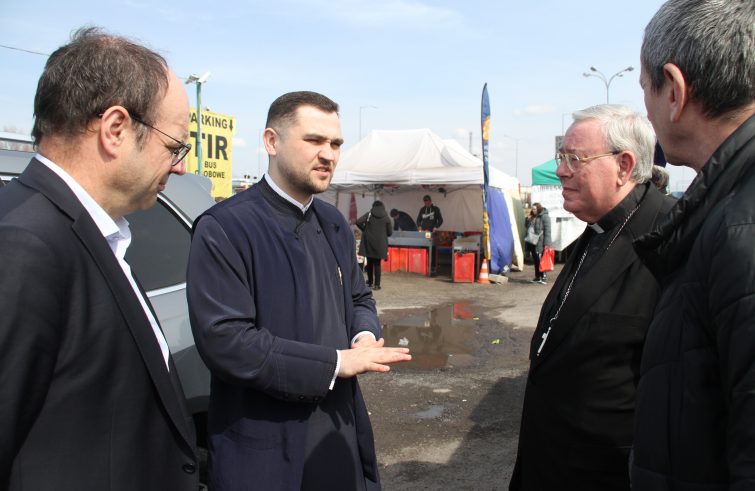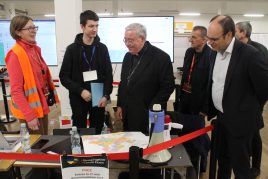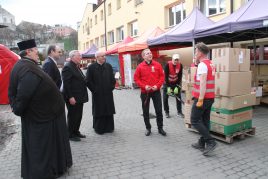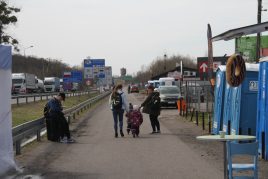
 On the Polish-Ukrainian border to convey solidarity with all refugees fleeing the war and to express gratitude to the thousands of people who are sheltering them. “This is the centre of Europe.” “It is where people are suffering, dying and being killed, tortured and raped.” Cardinal Jean-Claude Hollerich SJ, president of the Commission of the Bishops’ Conferences of the European Union ( COMECE) and the Rev Christian Krieger, president of the Conference of European Churches (CEC) illustrate the decision to travel to the Polish-Ukrainian border, at the Dorohusk-Yahodyn border crossing. The two presidents of COMECE and CEC, accompanied by the Orthodox Metropolitan Abel of Lublin and Chelm and by the Catholic Archbishop of Lublin Monsignor Stanisław Budzik, spent two days visiting some of the facilities that host and provide support to refugees. SIR interviewed them during a pause in their journey.
On the Polish-Ukrainian border to convey solidarity with all refugees fleeing the war and to express gratitude to the thousands of people who are sheltering them. “This is the centre of Europe.” “It is where people are suffering, dying and being killed, tortured and raped.” Cardinal Jean-Claude Hollerich SJ, president of the Commission of the Bishops’ Conferences of the European Union ( COMECE) and the Rev Christian Krieger, president of the Conference of European Churches (CEC) illustrate the decision to travel to the Polish-Ukrainian border, at the Dorohusk-Yahodyn border crossing. The two presidents of COMECE and CEC, accompanied by the Orthodox Metropolitan Abel of Lublin and Chelm and by the Catholic Archbishop of Lublin Monsignor Stanisław Budzik, spent two days visiting some of the facilities that host and provide support to refugees. SIR interviewed them during a pause in their journey.
Europe is horrified and shocked by the images arriving from Bucha, Irpin, and Kramatorsk, where Russian rockets hit the railway station, causing severe injuries and deaths. How is such horror possible here today?
Krieger: Our humanity is deeply wounded by these images. None of us ever expected war to be something wholesome, but these images cause deep pain. We believe it is important that justice be done for these crimes that can be tolerated nowhere in the world. This is something we all must uphold. I must also say that what is happening today in Ukraine will inflict long-lasting wounds that will affect our future generations and might be factors of division and hatred inside Europe.
Ways must be found to heal these wounds, but for this to happen, justice must be done.
 Card. Hollerich: The term ‘shock’ perfectly reflects the reaction I had. Shock can paralyse but it can also elicit a response. I hope that the shock will be transformed into practical help today, into a show of solidarity. It would be a blessing if communities in Western Europe were willing to offer their help to Polish cities that have been working hard to welcome the refugees.
Card. Hollerich: The term ‘shock’ perfectly reflects the reaction I had. Shock can paralyse but it can also elicit a response. I hope that the shock will be transformed into practical help today, into a show of solidarity. It would be a blessing if communities in Western Europe were willing to offer their help to Polish cities that have been working hard to welcome the refugees.
EU Commission President Ursula von der Leyen and EU High Representative Josep Borrell are presently in Kyiv to meet with Ukrainian President Volodymyr Zelensky. What is your message to the European Union from the Ukrainian-Polish border, from the heart of this crisis?
Hollerich: The European Union has consistently championed the values of justice, solidarity and peace. Now is the time to put these European values into practice and live them to the full. But these values come at a cost. Their fulfilment requires renouncing part of our wealth. I hope that Mrs Ursula von der Leyen will have the courage to propose this approach.
We are facing a major humanitarian crisis in the heart of Europe, which will most certainly last for a long time. The support we are asked to provide today cannot be a one-off emergency measure. It will have to be a long-term effort.
Krieger: First of all I would like to express my gratitude to Ursula von der Leyen and Josep Borrell. I consider this gesture to rise to the challenges. Their efforts and courage do credit to the European project. It is equally important that the Churches reaffirm the need to defend European values, even though it will come at a cost.
The financial reasoning on the thresholds for oil or gas sanctions is wrong if we want to defend European values.
These sanctions will obviously have a cost for us, but we must encourage the European Union and the EU member countries to be bolder when it comes to sanctions. Finally, I wish to add that in these days we have witnessed the extent to which the Polish welfare system has been challenged by the presence of 2.5 million Ukrainian refugees. We were touched by the generous welcome offered by all the people. This crisis will not be short-lived and neither Poland nor the other neighbouring countries can be left to handle it alone.
 The Church of Moscow and the Churches of Europe. It is widely described as a war between brothers, between Cain and Abel. The ecumenical movement appears to have failed in the dialogue for peace. So what can be done?
The Church of Moscow and the Churches of Europe. It is widely described as a war between brothers, between Cain and Abel. The ecumenical movement appears to have failed in the dialogue for peace. So what can be done?
Hollerich: First of all, I must say that it is not a failure of the ecumenical movement but a failure of Christianity.
If a war is waged, if a country is invaded, if women and children are killed, if the civilian population is targeted and massacres are carried out, it is contrary to Christianity.
That is why, I repeat, it is the failure of Christianity. However, here in Poland I see a great ecumenical effort being made by the Churches, by all denominations, to help the refugees. It is a powerful testimony that stems from Christian awareness.
Krieger: The word “failure” is both accurate and wrong. It’s accurate because, as occurred in the past, Christianity has yet again contributed to warfare. Once again we are seeing a combination – diabolical, I dare say – of ethnic, national and Christian identity, serving an ideology where Christianity has no place. And the fact that what is happening here and now occurred in the two 20th century world wars is a devastating reality. The ecumenical movement was born precisely to offer an answer to the question regarding the role of Christians. We are faced with this reality again today. However, at the same time, we must say that referring to it as an outright failure is a one-sided view of the ecumenical movement. We are here to offer a testimony. We can hardly say that the ecumenical movement has failed. On the contrary, the ecumenical movement is where the true bond that unites us all in Christ and the Gospel can be found, over and above our national and ethnic backgrounds and traditions. It also means identifying the bond that allows us to question our brother in Christ and at the same time manifest our distance from him.
I therefore call on Christian denominations to take a very clear stand against the Moscow Patriarchate with respect to its support for such a nefarious ideology.








